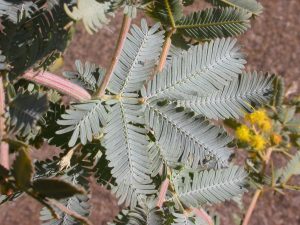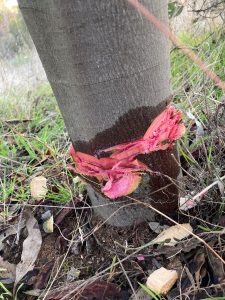
The main target of the working bee will be the non-local invasive Cootamundra Wattle, Acacia baileyana. The blue-green leaf of this environmental weed has three to four pairs of leaflets, the lowest pair is shorter and embraces the stem.
Join the Friends of Mount Majura (FoMM) working bee and help tackle woody weeds at the west slope of Mt Majura.
When: Sunday, 20 August 2023 from 1.00 pm to 4.00 pm.
Where: Meet at the nature park entrance Antill Street, North Watson; click here to view a map with the meeting and volunteer registration point and yellow outlined the target area.
Bring and wear: Sun protection, sturdy boots, body covering garden clothing and garden gloves if you have them; we’ll provide tools, herbicide and nitrile gloves to tackle the weeds.
Enquires: secretary@majura.org
Please be punctual. We will leave the meeting point at the gate shortly after 1pm to walk along Oldfields Lane to the target area and provide an introduction of the safe handling of equipment and herbicide. We will be working in pairs; if you do not like to use herbicide you may choose to be the cutter.
This will be a Search and Destroy activity in the Yellow Box Blakely’s Red Gum Grassy Woodland of Mount Majura’s west slope.
What kind of woody weeds to expect: Cootamundra Wattle, hybrids of Cootamundra Wattle, some Firethorns and some Cotoneasters. Hybrids of the introduced Cootamundra Wattle and the local Silver Wattle feature characteristics of both parent species, see distinguishing leaf characteristics of Cootamundra Wattle and Silver Wattle here. In doubt, please consult with experienced FoMM members.
Control of woody weeds using cut & dab and frill & fill.
Cut stems close to ground level and immediately treat cut surface with glyphosate applied at high concentration e.g. 1 part glyphosate : 2 parts water; apply herbicide mix with a spray bottle or dabber.
The plant’s natural protective mechanism acts very quickly to seal off the cut surface which would stop the penetration of herbicide into the sap stream. It is therefore important to treat the cut surface immediately, i.e. within 30 seconds after cut; the longer the treatment is delayed, the poorer the result will be. If necessary, cut and treat each stem of a multi-stemmed woody weed such as a firethorn separately to avoid delayed herbicide treatment.

Cootamundra Wattle frilled with an axe at the bottom of its bole; the pink colour is from a herbal marker dye mixed into the herbicide.
If a tree is too big to cut quickly with a hand saw or tree lobber, a better method is ‘frilling’ the tree. The principle of frilling is to cut into the sapwood with the sap transporting Cambium located under the bark and apply the herbicide to the cuts. Frilling can be done with a saw – run cuts around the tree and apply herbicide to each cut – or with a sharp axe – cut pouches around the tree at an angle of about 45degrees and fill with herbicide; the pouches can touch each other but should not be more than 2 cm apart.
View the deadly effect of frilling a Cootamundra Wattle in FoMM’s Woody Weed Album
Photos on this page by W. Pix.




